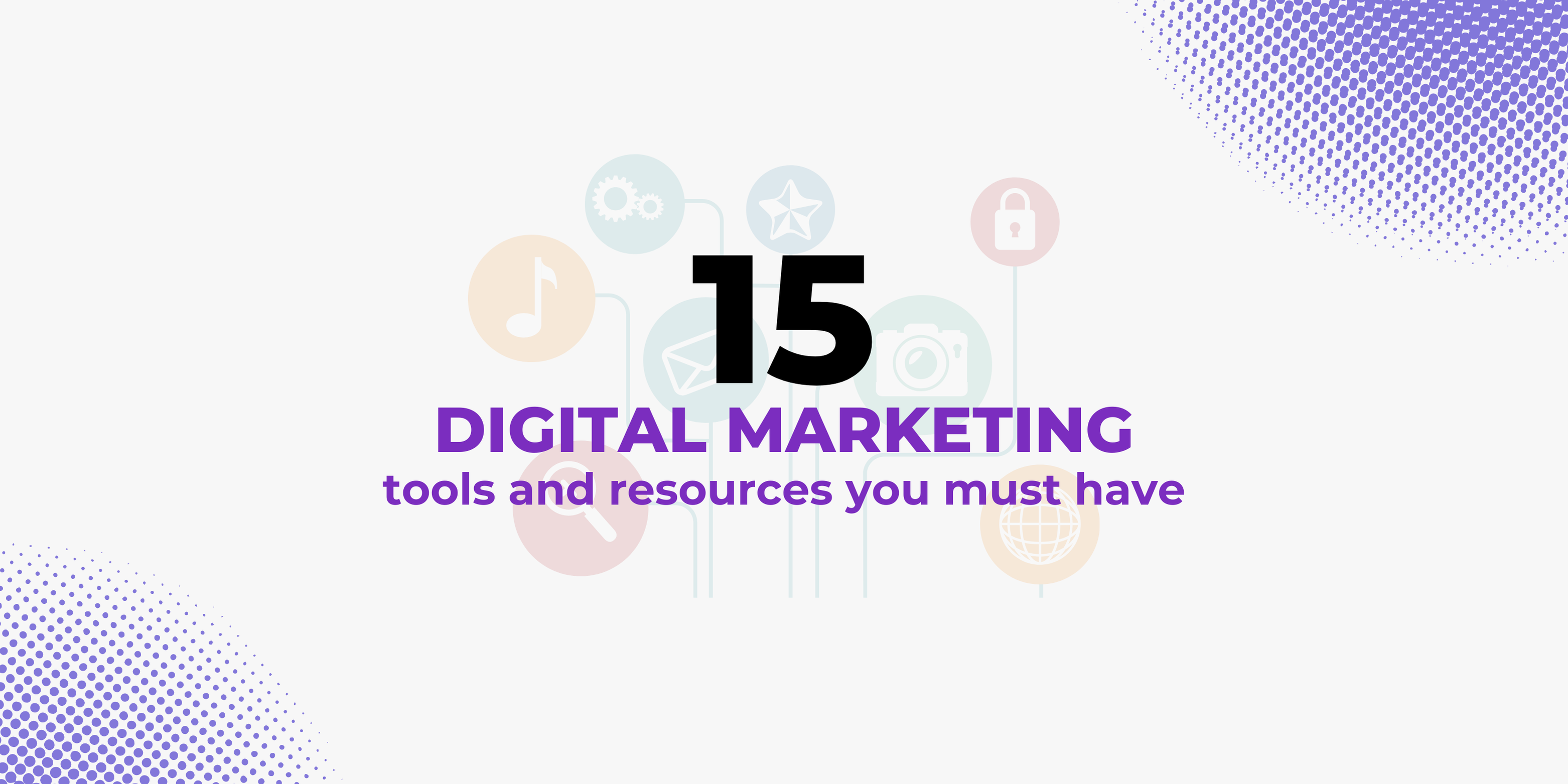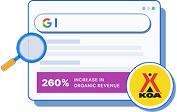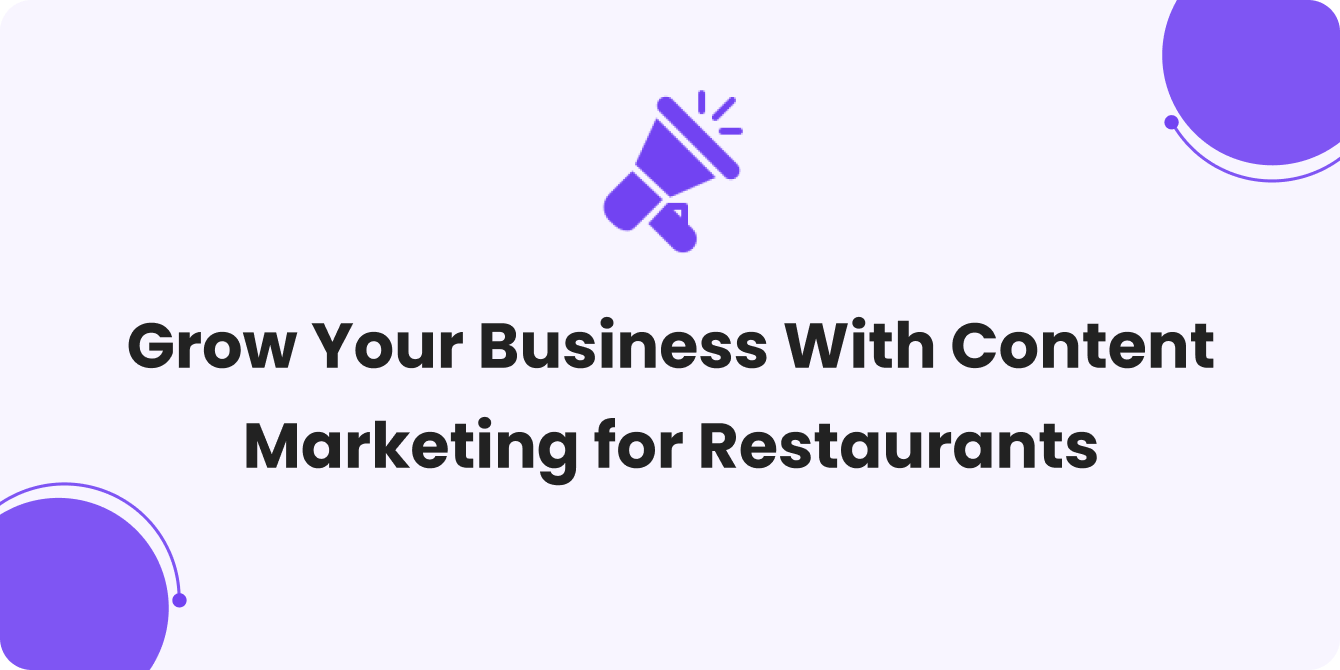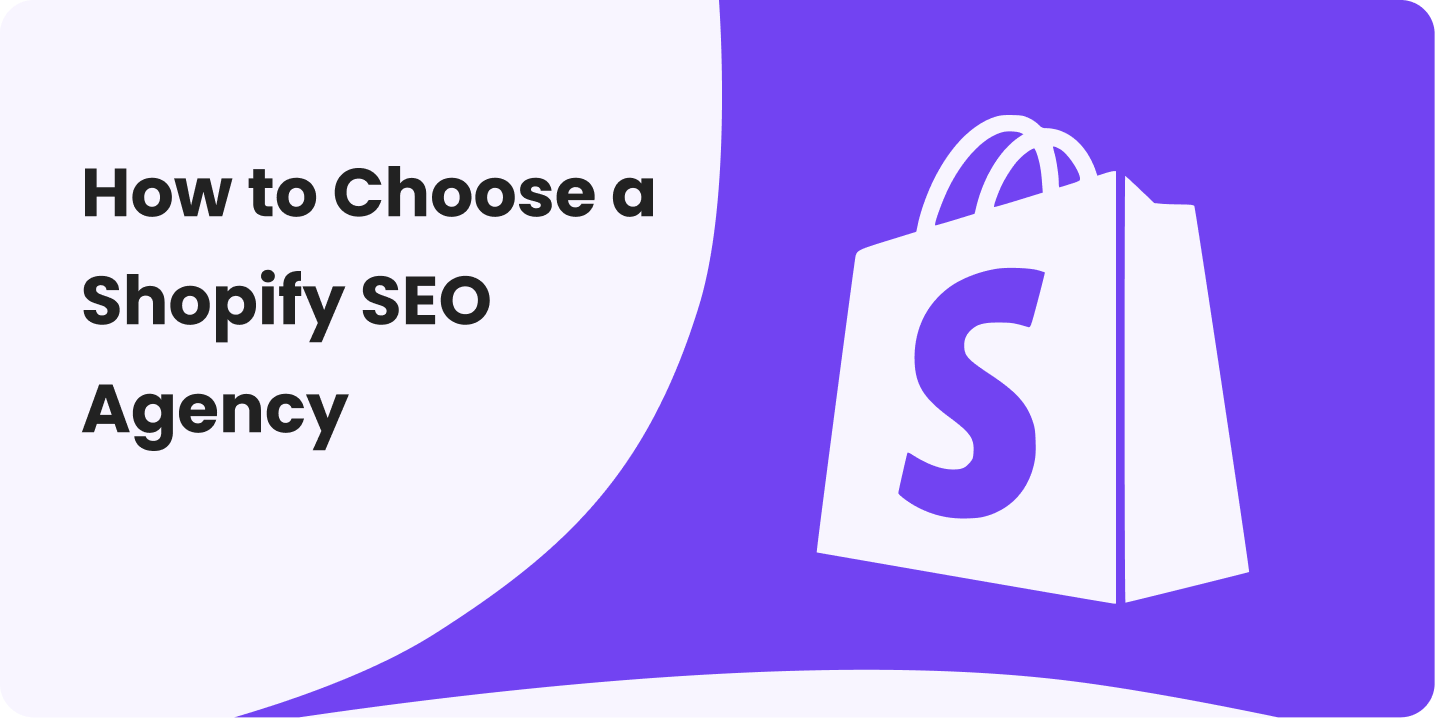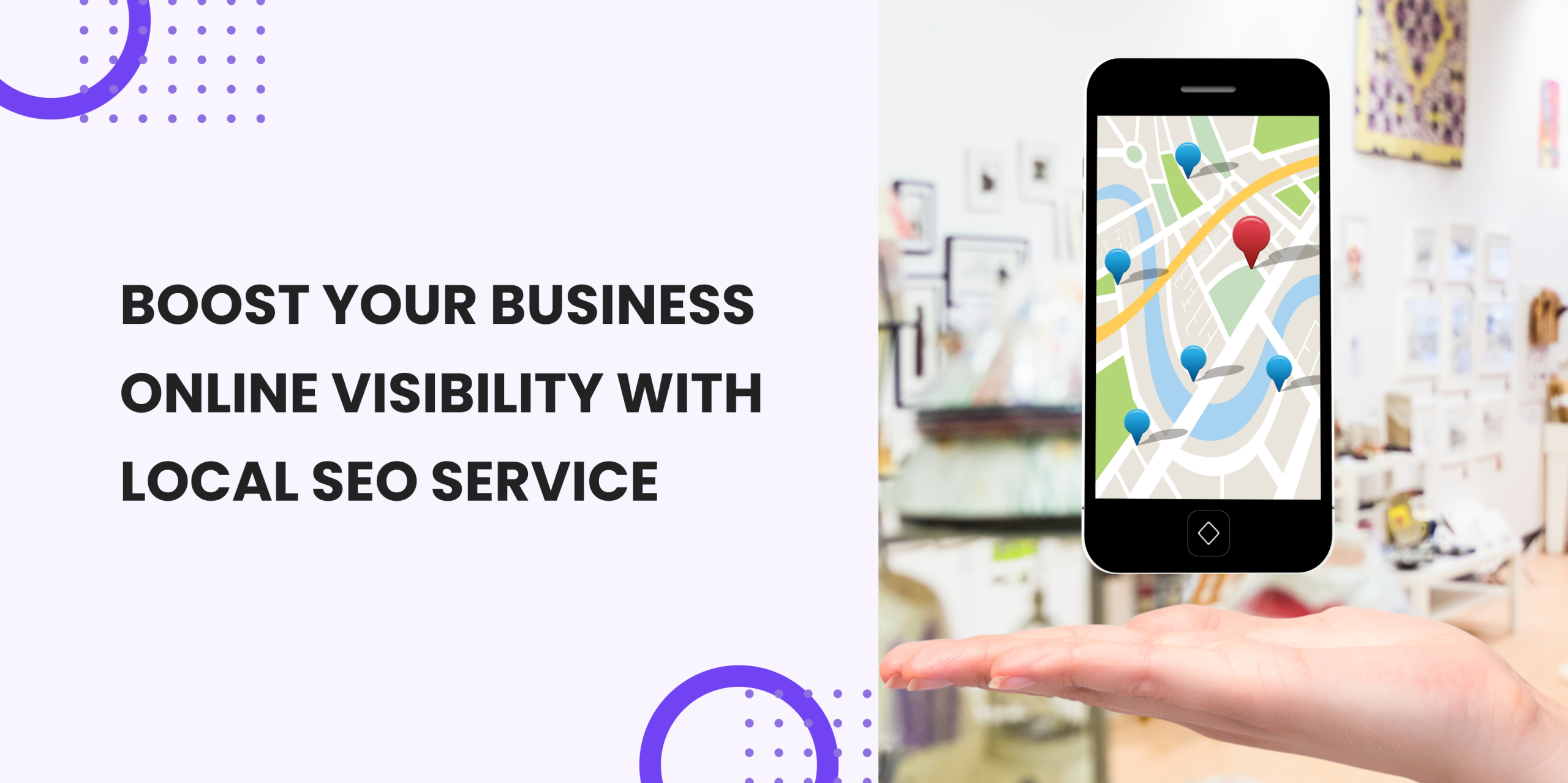Venturing through the world of digital marketing tools and resources can feel overwhelming. With so many options available, small businesses often struggle to decide which platforms will actually drive growth, increase visibility, and generate leads.
Large companies have dedicated marketing teams and substantial budgets to test different tools, but for small business owners juggling multiple roles, choosing the right digital marketing tools is critical to working smarter, not harder.
From SEO optimization and social media automation to email marketing and analytics, the right tools can transform your marketing efforts, saving time, reducing costs, and improving results.
But without a clear strategy, many businesses end up investing in the wrong platforms, wasting valuable resources.
That’s where a strategic approach comes in.
Instead of trying every new tool on the market, small businesses need a curated selection of the best digital marketing tools and resources tailored to their specific goals.
The best part is that the Meta Future helps businesses cut through the noise and select high-impact marketing tools that streamline operations and deliver measurable results.
In this guide, we’ll break down the top digital marketing platforms every small business should consider, so you can focus on growth, not guesswork.
Why Do Small Businesses Need Digital Marketing Tools
Running a small business is no joke. There’s a never-ending to-do list, managing customers, handling finances, and of course, marketing.
But here’s the thing: no matter how great your product or service is, if people don’t know about it, your business won’t grow.
This is the reason you need digital marketing tools and resources to help you grow. They help small businesses get noticed, attract customers, and compete with bigger brands, without requiring a huge budget or a full-time marketing team.
Without the right marketing tools, it’s easy to get lost in the noise. It’s like trying to run Facebook ads without analytics, or writing content without SEO insights.
It’s like throwing darts in the dark, hoping something sticks. But with online marketing software, you can track results, tweak strategies, and actually see what’s working.
Even big brands rely on top digital marketing platforms to stay ahead. According to HubSpot, businesses that use marketing automation generate 451% more leads.
That’s huge! And the best part? Many of the best digital marketing resources are affordable (or even free), making them perfect for small businesses looking to grow smart.
We’ve seen small businesses go from invisible to thriving just by using the right digital marketing tools. A local bakery, for example, doubled its orders by optimizing its Google Business Profile.
A personal trainer saw a spike in clients after automating email follow-ups. These aren’t massive changes, they’re just smart marketing moves made possible by the right tools.
With the right digital marketing tools and resources, you can work smarter, not harder, and actually see results. Because at the end of the day, small businesses don’t just need marketing, they need marketing that works.
Different Categories of Digital Marketing Tools
The right digital marketing tools and resources can take a huge load off your plate, making marketing easier, more effective, and even fun. Think of these marketing tools as your digital sidekicks.
They work behind the scenes, helping you rank higher on search engines, create engaging content, automate emails, and track performance, all without burning a hole in your pocket.
And the best part? You don’t have to be a tech genius to use them. Many of the top digital marketing platforms today are user-friendly and built for busy entrepreneurs who want results without the headache.
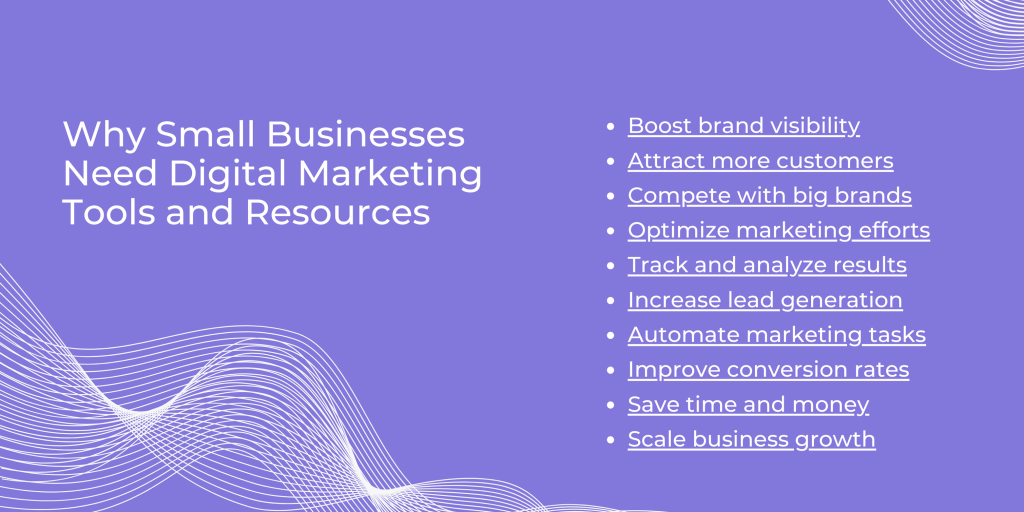
We’ve all heard the saying, “Work smarter, not harder.” That’s exactly what these best digital marketing resources do. Instead of spending hours manually posting on social media or guessing which keywords work best, you can let these tools do the heavy lifting.
To help you understand even better, we have categorized these useful tools into the following categories.
- SEO & Analytics: Google Analytics is like having a backstage pass to see what’s working on your website and what’s not.
- Social Media Marketing: Hootsuite makes it easy to schedule posts, track engagement, and manage multiple platforms from one place.
- Email Marketing & Automation: Mailchimp helps you send targeted emails, automate follow-ups, and keep your audience engaged effortlessly.
- Content Creation & Management: Canva turns anyone into a designer, helping you create stunning visuals without needing graphic design skills.
- Advertising & Lead Generation: Google Ads puts your business in front of people actively searching for what you offer, giving you instant visibility.
15 Digital Marketing Tools and Resources for Small Businesses (Arranged by category)
We’ve rounded up the 15 best digital marketing tools for small businesses, organized by category, to help you navigate the digital landscape with confidence.
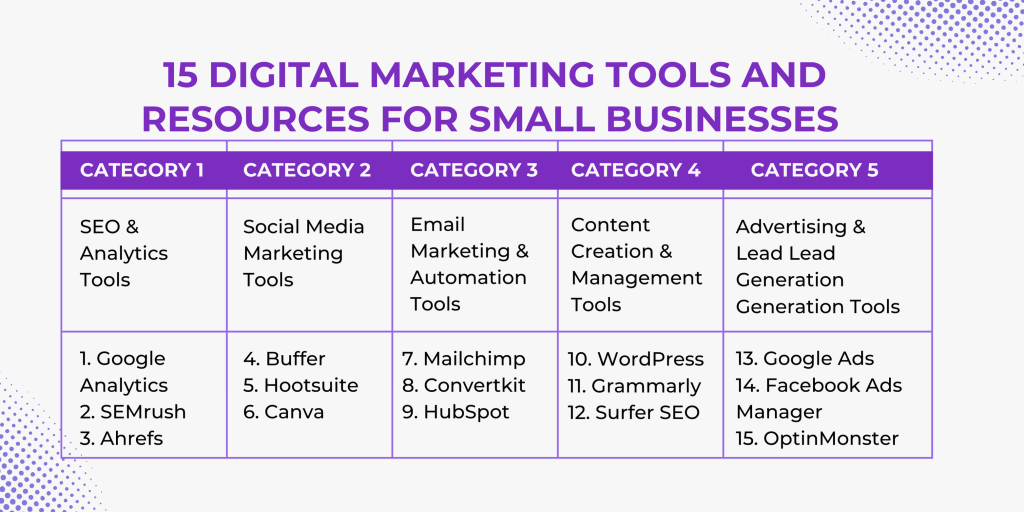
Category 1: Digital Marketing Tools and Resources
For small businesses, understanding website traffic, search rankings, and competitor strategies is essential to getting ahead. The ideal digital marketing tools and resources can provide clear insights, helping businesses refine their strategies and make smarter marketing choices.
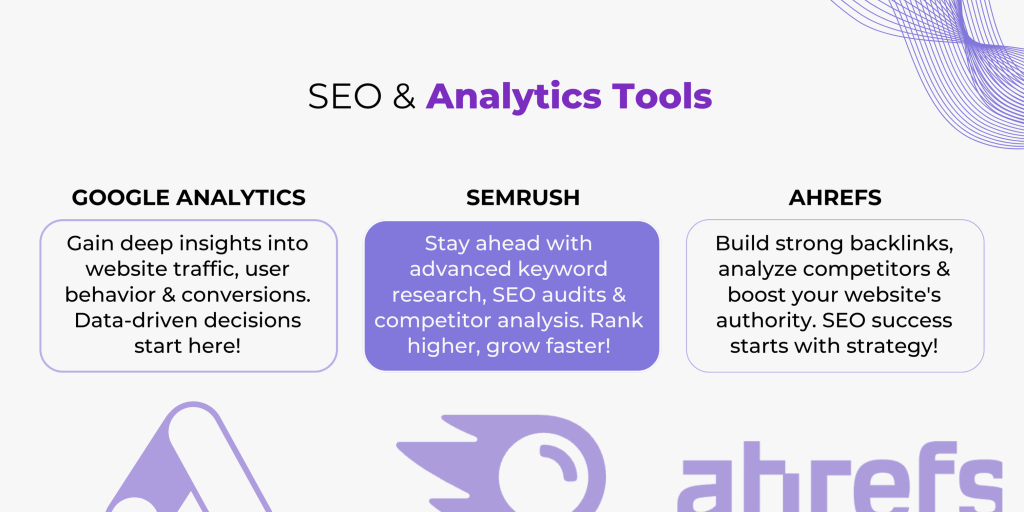
Let’s explore three top digital marketing platforms that small businesses can use to track performance, improve SEO, and drive growth.
1. Google Analytics
Ever wondered who’s visiting your website, where they’re coming from, and what they’re doing once they get there? Google Analytics (GA) provides these answers, and so much more.
As a free and powerful online marketing software, Google Analytics gives small businesses the tools they need to track website traffic, user behavior, and engagement. With this data, businesses can:
- Identify their best traffic sources – Is your audience coming from social media, search engines, or paid ads? Knowing this helps optimize marketing spend.
- Understand audience behavior – Are visitors engaging with your content or bouncing off quickly? This insight can guide website improvements.
- Track conversion rates – If visitors aren’t converting into leads or customers, GA helps pinpoint where the problem lies.
For example, imagine a local bakery running a digital ad campaign. Google Analytics will reveal which ads are bringing in customers, what pages they’re visiting, and whether they actually make a purchase. By analyzing this data, the bakery can tweak its campaigns to focus on the best-performing ads and improve conversion rates.
Google Analytics also integrates seamlessly with other top digital marketing platforms, like Google Ads and Google Search Console, making it a must-have tool for small businesses looking to refine their online marketing strategies.
2. SEMrush
When it comes to SEO, visibility is everything. If customers can’t find your business on Google, they’ll find your competitors instead. That’s where SEMrush comes in, a leading SEO tool that helps small businesses rank higher, attract more organic traffic, and outperform competitors.
So, what makes SEMrush one of the best digital marketing resources for small businesses?
- Keyword Research – Finding the right keywords is crucial for ranking on search engines. SEMrush provides in-depth keyword data, including search volume, competition level, and related terms, making it easier to create content that actually drives traffic.
- SEO Auditing – Small businesses often struggle with technical SEO. SEMrush scans websites for issues like broken links, slow loading speeds, or missing meta descriptions and provides actionable solutions to fix them.
- Competitor Analysis – Curious about what your competitors are doing differently? SEMrush reveals their top-performing keywords, backlinks, and paid ads strategy, allowing businesses to refine their own approach.
For instance, let’s say a small handmade jewelry brand is struggling to rank on Google. With SEMrush, they can identify high-value keywords that potential customers are searching for (e.g., “handmade silver rings” or “custom jewelry near me”).
They can also analyze competitors’ content strategies and discover opportunities to create even better blog posts, product pages, or ads.
Statistics prove the power of SEO: 75% of users never scroll past the first page of Google. By using SEMrush to optimize their content and technical SEO, small businesses can climb search rankings and stay ahead of the competition.
3. Ahrefs
SEO isn’t just about keywords, it’s also about building authority. Google ranks websites based on trustworthiness, and one of the strongest trust signals is backlinks, when other reputable sites link to yours.
Ahrefs is an industry-leading backlink analysis tool that helps small businesses build stronger SEO strategies by:
- Tracking backlinks – See which websites are linking to you and which backlinks you might be losing.
- Analyzing competitors’ backlinks – Discover where your competitors are getting links from and explore opportunities to earn similar links.
- Finding content gaps – Identify topics and keywords competitors are ranking for but your business isn’t, then create content to close the gap.
Consider a local fitness coach trying to attract more clients online. Ahrefs can help them analyze top-ranking competitors’ content and discover which blog posts, videos, or guest articles are earning backlinks.
With this insight, the coach can create similar (but better) content to attract links, boost SEO, and increase visibility in search results.
A study by Backlinko found that websites with more backlinks rank higher on Google (Backlinko). This means that for small businesses looking to grow, a solid backlink strategy powered by Ahrefs can make a massive difference in organic search traffic.
Category 2: Social Media Marketing Tools for Small Businesses
Managing multiple social accounts, creating engaging content, and tracking performance can feel overwhelming, but if you are using social media marketing tools everything changes.
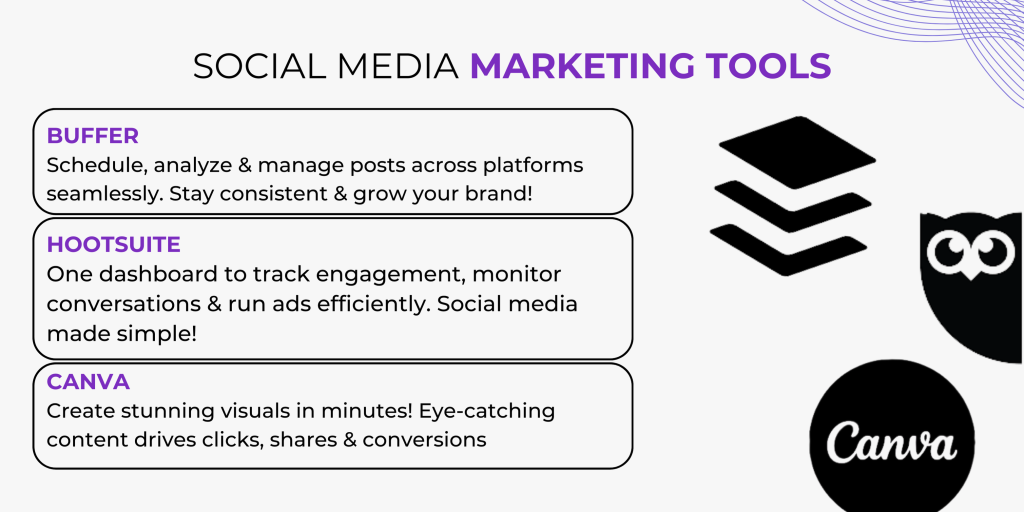
These tools simplify the process, helping you schedule posts, analyze engagement, and maintain a consistent brand presence without spending hours every day.
4. Buffer
Managing a small business is already demanding, keeping up with social media shouldn’t add to the stress.
Instead of posting manually on different platforms all day, Buffer lets you schedule content in advance, ensuring a consistent online presence with less effort.
Stay active, engage your audience, and focus on growing your business, without the constant hassle of posting.
Why does this matter?
Because consistency is key in social media marketing. Studies show that businesses that post regularly see higher engagement rates and stronger brand recall.
Buffer enables you to plan and schedule posts across multiple platforms from one dashboard, ensuring your brand stays active even when you’re busy.
Beyond scheduling, Buffer provides analytics that help small businesses understand what’s working and what’s not. With detailed insights on post performance, such as likes, shares, and engagement rates, you can refine your strategy and create content that resonates with your audience.
Engagement tracking is another game-changer. Instead of manually checking comments and messages across different platforms, Buffer centralizes them, making it easy to respond to followers promptly.
This is crucial, considering that 71% of consumers who have a positive interaction with a brand on social media are likely to recommend it to others.
In short, Buffer doesn’t just help you post, it helps you connect, engage, and grow your audience.
5. Hootsuite
If you’re managing multiple social media accounts, Hootsuite is one of the top digital marketing platforms that can simplify the process.
It’s more than just a scheduling tool, it’s a full-fledged social media command center that allows businesses to publish, monitor, and even run ads seamlessly across different platforms.
For small business owners, time is money. Hootsuite’s multi-platform publishing feature allows you to draft, schedule, and post content across all major social media networks from a single dashboard.
No more logging in and out of multiple accounts, everything is managed in one place.
But what makes Hootsuite stand out is its ad monitoring capabilities. Running social media ads can be an effective way to boost brand visibility, but without proper tracking, it’s easy to waste money on ineffective campaigns.
Hootsuite integrates with paid advertising platforms, allowing businesses to track ad performance, adjust targeting, and optimize budgets in real time.
Social listening is another powerful feature. Instead of guessing what your audience wants, Hootsuite helps you track brand mentions, industry trends, and customer sentiment.
Hootsuite alerts you instantly so you can address it before it escalates. Are people raving about a new trend? You can jump in on the conversation before your competitors do.
With over 4.9 billion social media users worldwide, staying ahead of the competition requires more than just posting content, it requires strategy. Hootsuite equips small businesses with the tools to manage their online presence efficiently, track audience sentiment, and ensure marketing efforts translate into real growth.
6. Canva
Let’s face it: in today’s fast-scrolling world, eye-catching visuals are essential. A post with high-quality graphics is 40 times more likely to be shared than a post without visuals.
This is the reason Canva has become a must-have online marketing software for businesses that want to create stunning social media graphics without hiring a designer.
Canva’s drag-and-drop interface makes it incredibly easy to design professional-looking posts, even if you have zero graphic design experience. Whether you’re creating an Instagram story, a Facebook ad, or a LinkedIn banner, Canva offers thousands of customizable templates tailored to different social media formats.
This means no more worrying about image dimensions or aspect ratios, just pick a template, add your branding, and you’re good to go.
But Canva isn’t just about making things look pretty, it’s a branding powerhouse. Small businesses can create a consistent visual identity by saving brand colors, fonts, and logos, ensuring every post reflects their unique style.
And in a crowded digital space, brand consistency increases recognition by up to 80%, making your business more memorable to potential customers.
Another major advantage? Canva speeds up content creation. Instead of spending hours designing posts from scratch, you can whip up engaging visuals in minutes. This is especially helpful for businesses that need to post frequently but don’t have the budget to hire a full-time designer.
For those diving into video marketing, Canva’s animated design features allow businesses to create motion graphics and short videos, perfect for Instagram reels, Facebook stories, and TikTok promotions.
Given that videos generate 1,200% more shares than text and image content combined, using Canva to create dynamic social media content can significantly boost engagement.
Category 3: Email Marketing & Automation Tools
Email marketing remains one of the most powerful digital marketing tools and resources for small businesses.
It offers a direct, cost-effective way to nurture leads, retain customers, and drive sales. In fact, studies show that email marketing delivers an average ROI of $42 for every $1 spent, making it one of the best digital marketing resources available.
But here’s the challenge: managing email marketing manually is time-consuming, and without the right tools, it’s easy for emails to get lost in crowded inboxes.
With email marketing and automation software small businesses can easily streamline their outreach, personalize communication, and maximize engagement.
Let’s explore three top digital marketing platforms that can transform the way you connect with your audience.
7. Mailchimp
If you’re looking for an all-in-one email marketing tool that’s beginner-friendly yet packed with powerful features, Mailchimp is a solid choice. It’s one of the most widely used digital marketing tools, trusted by over 13 million businesses worldwide.
But what makes Mailchimp stand out?
First, automation. Small businesses don’t have time to send individual emails to every subscriber, and Mailchimp takes care of that. With its automated email sequences, you can welcome new subscribers, follow up with customers who abandoned their carts, or send personalized recommendations based on past purchases, all without lifting a finger.
Then there’s segmentation, which helps you send the right message to the right audience. Instead of blasting the same email to your entire list, Mailchimp lets you group your audience based on behavior, purchase history, or engagement levels.
This means your customers receive content that actually interests them, increasing open rates and conversions.
Finally, A/B testing takes the guesswork out of email marketing. Not sure whether a subject line with an emoji will perform better? Wondering if a CTA button in red will get more clicks than one in blue?
Mailchimp lets you test different variations and automatically selects the best-performing option, ensuring your emails are always optimized for success.
For small businesses, Mailchimp is a game-changer, it saves time, improves engagement, and helps you turn casual subscribers into loyal customers.
8. ConvertKit
If you’re a small business owner who creates content, whether you’re a blogger, coach, consultant, or eCommerce seller, then ConvertKit is one of the best digital marketing tools and resources you can use.
Designed specifically for creators, it goes beyond standard email marketing by helping you build an engaged community around your brand.
One of ConvertKit’s standout features is its lead capture forms. These simple, customizable opt-in forms make it easy to collect emails from website visitors, social media followers, or even webinar attendees.
Whether you’re offering a free guide, a discount code, or an exclusive newsletter, ConvertKit helps you grow your subscriber list effortlessly.
But collecting emails is just the first step. What really makes ConvertKit shine is its automation workflows.
A visitor downloads your free eBook. Instead of receiving just one thank-you email, they enter an automated email sequence, a nurturing funnel, that introduces them to your brand, shares valuable tips, and eventually encourages them to purchase your product or service.
All of this happens on autopilot, allowing you to focus on your business while ConvertKit does the heavy lifting.
And let’s talk about simplicity. Unlike some marketing tools that come with a steep learning curve, ConvertKit keeps things clean and intuitive. Its visual automation builder makes it easy to create email sequences without needing a tech background.
For small businesses that rely on content marketing or personal branding, ConvertKit is a must-have online marketing software that helps you connect with your audience in a meaningful way.
9. HubSpot
While Mailchimp and ConvertKit focus primarily on email marketing, HubSpot takes things a step further. It’s a comprehensive CRM (Customer Relationship Management) platform that integrates email marketing with lead management, sales tracking, and customer support.
If your small business is scaling and you need a 360-degree view of your customer interactions, HubSpot is one of the top digital marketing platforms to consider.
One of HubSpot’s biggest advantages is its seamless email automation.
Let’s say a potential customer visits your website and downloads a free resource. Instead of just adding them to your email list, HubSpot tracks their engagement, which pages they visit, what products they’re interested in, and how often they open your emails.
Based on this data, HubSpot automatically sends personalized email sequences that guide the lead toward making a purchase.
This brings us to lead nurturing, an area where HubSpot excels. Unlike traditional email marketing software, HubSpot connects your emails with your entire sales funnel.
For example, if a lead has shown interest in a particular service but hasn’t taken action, HubSpot can trigger a series of well-timed follow-up emails with testimonials, case studies, or limited-time offers to encourage conversion.
What’s more, HubSpot’s built-in analytics and reporting tools help you track the effectiveness of your email campaigns. You can see which emails are driving the most engagement, where leads are dropping off, and what changes you need to make for better results.
For small businesses that want to scale beyond basic email marketing, HubSpot is an invaluable marketing tool that combines email automation, CRM capabilities, and lead management into a single, powerful platform.
Category 4: Content Creation & Management Tools
For small business owners juggling multiple roles, the right content creation and management tools can streamline the process, ensuring efficiency without compromising quality.
Let’s explore three game-changing platforms, WordPress, Grammarly, and Surfer SEO, that make content creation easier, more effective, and SEO-friendly.
10. WordPress
If you’re building a website or running a blog, WordPress is likely the first name that comes to mind. And for good reason, it powers over 43% of all websites on the internet.
Whether you’re launching a personal blog or an eCommerce store, WordPress offers a flexible, SEO-friendly, and user-friendly platform for managing your content.
One of the biggest advantages of WordPress is its content management system (CMS). Unlike traditional website builders, a CMS allows you to easily create, edit, and organize content without needing advanced technical skills.
You don’t have to be a coding expert, if you can handle a Word document, you can manage content on WordPress.
But what really sets WordPress apart for small businesses?
- SEO-Friendly Blogging – WordPress comes with built-in features that help optimize your content for search engines. From customizable permalinks to mobile responsiveness, it ensures your blog posts and web pages have a better chance of ranking higher.
- Plugins Galore – With thousands of plugins available, you can enhance your site with tools like Yoast SEO for on-page optimization, Elementor for easy page building, and WPForms for user-friendly contact forms.
- Scalability Without the Price Tag – Small businesses often start with a modest website but need room to grow. WordPress allows you to expand your site without switching platforms, making it a long-term investment.
For small businesses looking to establish an online presence and create compelling content, WordPress is an essential tool that simplifies website management while keeping SEO at the forefront.
11. Grammarly
You may have spent hours crafting the perfect blog post, only to realize later that it’s filled with typos, awkward phrasing, or unclear messaging. Mistakes like these can harm your credibility and make readers lose trust in your brand.
This is where Grammarly steps in as one of the best digital marketing resources for content creation.
Grammarly isn’t just a spell checker, it’s an AI-powered writing assistant that analyzes your content for grammar, clarity, engagement, and even tone. It works across multiple platforms, including Google Docs, WordPress, and email, ensuring your writing is polished wherever you go.
Why should small businesses use Grammarly?
- Error-Free Content Every Time – Even the most experienced writers make mistakes. Grammarly catches errors in real-time, from simple typos to complex grammatical inconsistencies, saving you from embarrassing slip-ups.
- Better Readability & Engagement – Small business owners often write their own blog posts, newsletters, or social media captions. Grammarly offers clarity suggestions to make sentences more concise, engaging, and easier to read.
- SEO-Friendly Writing – A key factor in digital marketing tools is readability. Google prefers content that’s clear and structured. Grammarly helps improve sentence flow and reduces passive voice, making your content more engaging for both readers and search engines.
- Customization for Brand Voice – Whether you want your writing to sound professional, casual, or persuasive, Grammarly adjusts suggestions based on your preferred tone. This ensures that all your content maintains a consistent brand voice across platforms.
For small businesses that lack dedicated content teams, Grammarly acts as an affordable, always-available editor that improves content quality and professionalism.
12. Surfer SEO
Creating great content is only half the battle, getting it to rank on Google is the real challenge.
That’s where Surfer SEO helps.
This powerful tool analyzes top-ranking content and provides data-driven recommendations to optimize your writing for better search visibility.
Unlike traditional keyword research tools, Surfer SEO provides real-time content analysis, giving you clear recommendations on keyword density, structure, word count, and readability to improve your chances of ranking.
Here’s why small businesses should consider using Surfer SEO:
- Data-Backed Content Optimization – Instead of guessing which keywords to use or how long your blog post should be, Surfer SEO analyzes top-ranking pages and provides specific recommendations to make your content competitive.
- Keyword Density Insights – Adding too many or too few keywords can hurt SEO. Surfer SEO suggests the optimal keyword frequency to maintain a natural flow while improving rankings.
- SEO Score for Instant Feedback – The platform assigns an SEO score to your content, showing you exactly where improvements are needed. This helps small businesses create better-optimized articles without hiring an SEO expert.
- Integration with Google Docs & WordPress – You don’t have to switch between tools, Surfer SEO works directly in Google Docs and WordPress, streamlining your workflow.
Surfer SEO essentially eliminates the guesswork from content creation, ensuring that every blog post or landing page is fully optimized for search engines. For small businesses looking to increase organic traffic and visibility, this tool is a game-changer.
Category 5: Advertising & Lead Generation Tools
Among the best digital marketing resources available, Google Ads, Facebook Ads Manager, and OptinMonster stand out as game-changers.
Each offers powerful ways to connect with potential customers, whether through targeted ads, retargeting strategies, or conversion-boosting pop-ups. Let’s look at how small businesses can use them.
13. Google Ads
When it comes to online marketing software, Google Ads is one of the most powerful tools for small businesses. It allows you to place your business right in front of customers actively searching for products or services like yours.
For instance, you run a local bakery, someone searching “best cupcakes near me” sees your ad at the top of Google’s search results. That’s instant visibility to a high-intent customer.
One of the biggest advantages of Google Ads is Pay-Per-Click (PPC) advertising, meaning you only pay when someone clicks on your ad. This makes it a cost-effective option, especially for businesses with tight budgets. Plus, it provides:
- Advanced audience targeting: You can target people based on location, demographics, interests, and even past website visits.
- Keyword-based advertising: Google Ads lets you bid on specific keywords relevant to your business, ensuring your ads appear when potential customers search for them.
- Conversion tracking: Want to know which ads are driving sales, sign-ups, or inquiries? Google Ads tracks conversions, helping you understand what’s working and what’s not.
According to WordStream, the average Google Ads conversion rate across industries is 3.75% for search ads. That means for every 100 people who click on your ad, nearly four could become paying customers.
To get the most out of Google Ads, small businesses should focus on optimizing ad copy, using negative keywords to avoid irrelevant clicks, and setting clear campaign goals.
The key is to start small, experiment with different ads, and gradually scale up based on performance.
14. Facebook Ads Manager
With over 3 billion monthly active users on Facebook and Instagram, it’s no surprise that Facebook Ads Manager is one of the top digital marketing platforms for small businesses.
Unlike Google Ads, which captures search intent, Facebook Ads helps you reach potential customers before they even start searching, by appearing in their feeds as they scroll.
One of the biggest strengths of Facebook Ads Manager is its ability to create highly targeted social media ad campaigns. You can fine-tune your audience based on:
- Age, gender, location, and interests
- Browsing behavior and past interactions with your business
- Custom audiences (e.g., targeting people who have visited your website)
This precision targeting helps maximize ad spend efficiency, ensuring your message reaches the right people at the right time.
Another major benefit is A/B testing, which allows businesses to compare different ad variations to see what works best. For example, if you’re promoting a new skincare product, you could test:
- Ad creatives: Does an image or video perform better?
- Headlines: Does “Get Clearer Skin Today” drive more clicks than “Say Goodbye to Acne”?
- Call-to-action buttons: “Shop Now” vs. “Learn More”, which generates more engagement?
Facebook Ads Manager also offers retargeting, meaning you can show ads to people who have previously visited your website but didn’t make a purchase. Studies show that retargeting ads can increase conversion rates by up to 70% compared to standard ads.
For small businesses, the best approach is to start with a small budget, test different ads, and gradually scale up once you see what works best.
The combination of detailed audience targeting, A/B testing, and retargeting makes Facebook Ads Manager a must-have marketing tool for businesses looking to increase brand awareness and conversions.
15. OptinMonster
Getting people to visit your website is only half the battle, converting them into leads and customers is where OptinMonster shines.
This conversion optimization tool helps small businesses capture visitor interest through strategically placed lead generation pop-ups, floating bars, and exit-intent forms.
Here’s how it works: Someone is browsing your website, but is about to leave without making a purchase. With exit-intent technology, OptinMonster detects this and triggers a pop-up offering a special discount or freebie in exchange for their email.
That simple prompt can turn an abandoning visitor into a potential customer.
OptinMonster is especially effective for:
- Growing email lists: Offering free guides, discount codes, or exclusive deals in exchange for an email address.
- Boosting conversions: Personalized pop-ups based on user behavior encourage sign-ups, purchases, or downloads.
- Reducing cart abandonment: Exit-intent pop-ups reminding shoppers of items left in their cart (with an added discount) can recover up to 15% of lost sales.
According to OptinMonster, businesses using their platform see an average conversion rate increase of 2.09%, which can make a massive difference in revenue over time.
For small businesses, OptinMonster provides an easy way to optimize website traffic, increase engagement, and ultimately drive more sales, without needing advanced coding skills.
By simply integrating it with existing email marketing tools like Mailchimp or ConvertKit, businesses can build stronger customer relationships and nurture leads over time.
Summary
With the right digital marketing tools and resources, small businesses can compete effectively, attract customers, and drive long-term growth.
From SEO and content marketing tools to advertising and lead generation platforms, every tool we’ve explored in this guide serves a specific purpose in helping businesses increase visibility, engage their audience, and convert leads into loyal customers.
At The Meta Future, we understand that navigating digital marketing can feel overwhelming, especially when you’re juggling multiple responsibilities as a business owner.
That’s why we specialize in helping small businesses craft data-driven, results-focused digital marketing strategies tailored to their unique needs.
Get in touch with The Meta Future today and discover how we can help you grow!

